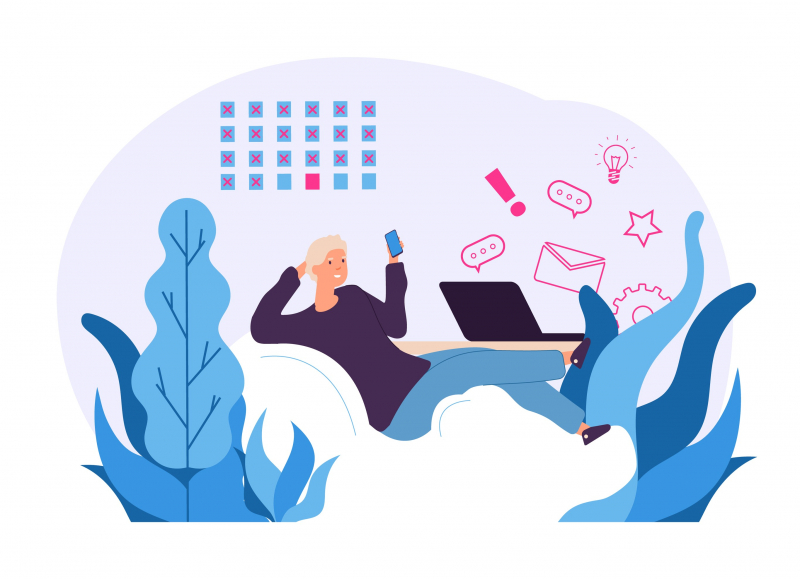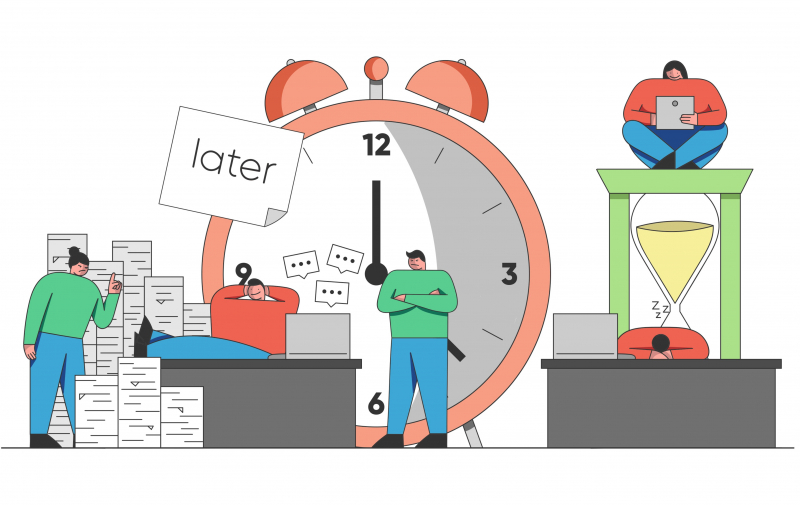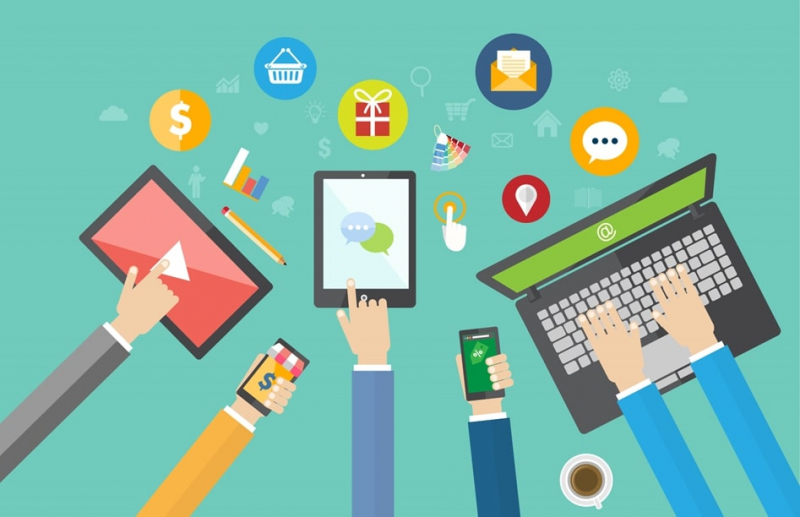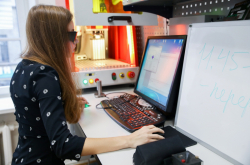Organizing your workplace
It’s very important to create a space at your home that would at least be remotely similar to a workplace. You’ll probably have to make a few rearrangements, buy a screen or a partition wall. Shifting things around will energize your brain and help it change its perception of a familiar space, give it some work motivation. If you live with your family, children, or flatmates, and you don’t have a separate room, a privacy screen could help – you can use it to mark your personal space and indicate to others that you’re busy and needn’t be disturbed.
Remove all random items from your sight, let minimalism reign on your workdesk. Get rid of all irritating factors: the TV, loud music, phone notifications; close all unnecessary tabs in your browser. If necessary, put on noise-cancelling headphones – you can work in silence or turn on some unobtrusive background music that will help your concentration.
Be sure to keep in touch with your colleagues or classmates during the working day, but don’t use work correspondence and chats for discussing personal matters – this is a distraction both for you and your colleagues. Stay in touch with your immediate supervisor, and be ready to quickly react to their tasks, respond to their questions and ask yours.

Obtain the contacts of people you need to communicate with as part of your work or studies in advance – first and foremost, these are the contacts of your colleagues, classmates, work or research supervisors, lecturers, partners, clients. Arrange between yourselves the formats in which you’ll be communicating, the messengers you’ll be using. Create a joint-access cloud storage with all the documents and learning materials you’ll need for your work or studies.
If you’re not currently using any joint project management services at work, this is the time to start. There are lots of such services and platforms now, the most popular ones being Bitrix24 and Trello.
Make sure that you have a fast and stable internet connection. If this isn’t the case, think about changing your internet provider or change your data plan.
If you have to do any paperwork, make sure that you have all necessary tools: a working printer, pens, paper, stapler, etc.

Managing your time
Let’s say that you got a grip on your at-home workspace, how, then, do you manage your time? It’s simple – just keep to the established work schedule and don’t break the pattern you got accustomed to. Yes, now that you don’t have to commute to work to the other side of the city, it would seem that you can allow yourself to sleep in a bit. But doing so is highly discouraged – because of such indulgences, you’ll find it more and more difficult to set yourself up for productive work.
All this considered, get up at the time you usually get up, wash your face, get dressed, have breakfast. Put the hour you’d spend on commuting to good use: cook yourself a proper breakfast, read a book, do some exercise.
Same goes for the breaks: have lunch at your usual time, have water and snacks at the ready, prepare a flask with some coffee or tea – this way, you won’t get constantly distracted on checking the contents of your fridge.
The biggest productivity killer is when you perceive working from home as some sort of a semi-vacation. Yes, you may have some more free time at your disposal, but this doesn’t mean that you can bail on your responsibilities and do something more interesting instead. Keep the same work-life balance you used to have, don’t shift your work hours, organize your household chores so that they won’t interrupt your work process.

Clear-cut planning can help prevent your falling out of step with your schedule. Write down your daily tasks in detail, break them down to smaller tasks, set deadlines. And make sure to keep records – both for you and your supervisor, tick off completed tasks and mark down all that’s yet to be completed. A plan can help you visualize the work process, and this helps not only your concentration but also motivation.
For starters, try to make a small recap at the end of every hour. After you get used to that, you can start checking in with yourself in the middle of the day, for example at lunch, and at the end of the day. When your workday ends, praise yourself for the work you’ve done, and mull over what you can do better and more productively – and plan your next day accordingly.
If you experience problems with concentrating, give time management techniques a go, for example the pomodoro one: you work for 25 minutes without any distractions, have a five -minute break, and then work for 25 minutes more. It’s important that you spend these five minutes of rest not on checking your social media but doing something as unrelated to work as possible. For instance, you can walk around the house, do a quick workout, do some push-ups, or just sit for a bit with your eyes closed.
There are hundreds of apps in Google Play and App Store for facilitating time management. We recommend the app Forest: you set a time period during which you intend to concentrate on work, “plant” a tree, and if you get distracted and start checking your phone, the tree dies. It’s surprisingly very motivating.

Self-organization
And now, we’re approaching the most important but difficult aspect: how to make yourself study or work without spiraling into apathy or getting bogged down in procrastination?
Firstly, make yourself look presentable in the morning: change your PJs to something more work-appropriate, comb your hair – this will help you switch to work mode or prevent any additional embarrassment if you suddenly have to make a video call.
Secondly, try to complete the most important, complicated or just unpleasant tasks in the morning or at least before lunch. This way, they won’t detract your attention or spoil your entire day (or even couple of days, if you’re prone to putting things on a back burner).
If you’re prone to procrastination, think why. Most often, the tendency to procrastinate is linked to fear or frustration because the workload is too big or the task is too difficult. There is a saying, “Eat an elephant one bite at a time.” Put it to work and break all your tasks down to smaller ones – to the point that they become really easy to do. Be sure to tick each one off once you’ve finished with it, even if it’s the least significant item on the list. This will trick your brain and motivate it to work productively.

Once again, try out different time management methods – these are many and varied. For example, the Eisenhower matrix proposes that you divide all your tasks into categories important/not important and urgent/not urgent, while the ABCDE method helps you categorize your tasks depending on their priority, and even drop some of them.
Make sure that the people you live with understand that you’re not to be disturbed. Setting your personal boundaries is a very important skill, and the situation where everyone works at home is a great opportunity to practice it. Communicate your boundaries and your work hours to others – this will make it easier for them to respect your personal space and not disturb you during the working process.
In reality, the transition to remote work or learning is a great opportunity for self-observation. Try to keep track of your natural biorhythms: in what time of the day you’re the most productive, and vice versa. Distribute your workload accordingly, schedule important calls and meeting to the time that you’re most resourceful, try to complete all tasks before productivity wanes. You obviously won’t be able to ignore your colleagues’ work schedules and the general task flow, but such self-observation will come in handy in the future, too.

Try to do some lifelogging: download apps for recording your work and free time, lists of tasks with a possibility of monitoring their progress, habit trackers.
Sports
If you’re used to having a workout regime – don’t give it up. The closure of fitness centers and gyms isn’t a catastrophe: just swap your usual workouts with at-home ones. If sports have never been part of your daily routine, maybe it’s time to review it. Remember that for your brain to work properly, you need to get at least some physical activity. Even short workouts help you take your mind off things, recharge and continue your work reinvigorated.





